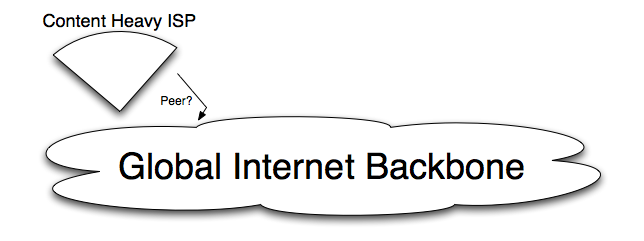On the surface, peering appears to be an obviously good idea from a business (financial) and technical perspective. But not all ISPs see peering as automatically providing benefits. Here are the top ten reasons ISPs gave for not peering.
1) Traffic Asymmetry and Investment Asymmetry means that one party bears more of the cost as a result of peering. (See "The Folly of Peering Ratios" for a more complete discussion of this issue. )
In brief, consider the figure below where a Content Heavy ISP wants to peers with a global Internet backbone. Web traffic (the dominant traffic flow on the Internet) is inherently asymmetric so the Content Heavy ISP is a net source of content,and therefore uses more of the Global backbone provider's resources (bandwidth across the entire path of the network) than the Content Heavy ISP who simply dumps the traffic onto the peer at the peering point.

"I don't want to haul your traffic around the world for free, when I only gain a few peer routes in return."
In some cases ISPs will peer without settlement up to a certain traffic ratio (for example 4:1 traffic out to traffic in) and then de-peer or negotiate on a usage basis beyond that on a Mbps basis . In the Exodus-GTEI depeering-negotiations-repeering, rumor has it that the solution was to peer at more locations and to engineer cold-potato routing to reduce the distance the traffic had to spend on the GTEI backbone .
2) Transit Sales are Preferred. There may be the potential for transit sales if they don’t peer . Some ISPs will not peer if there is any existing or pending customer-provider relationship between the parties, even if the sale is completely unrelated to interconnection (i.e. fiber sale or colo sale) . Ren Nowlin (Onyx/Level 3) described the Level 3 policy here as "Once a customer, never a peer".
3) Ports are for revenue. Peering consumes resources (router interface slots, circuits, staff time, etc.) that could otherwise be used to revenue generation. Router slots, cards, interconnection costs of circuits or Internet Exchange environments, staff install time are incremental expenditures. Further, operating costs, particularly for peering sessions with ISPs without the necessary on-call engineering talent, may require increased processing power for filters, and otherwise take staff time that could be focused on paying customers.
4) Keep Transit Pricing from Sliding, the Motivation not to commoditize IP transit. Tier 1 ISPs compete on the basis of better performance. They accomplish better performance by leveraging a large customer base of direct attachments and high-speed interconnections with other Tier 1 ISPs. Since peering with other ISPs improves the performance of the “peer”, it effectively makes your competitors into a more powerful competitor. Therefore, there is a strong disincentive to peer and increase the number of top tier competitors.
5) Prefer to be a Customer with SLAs. As a “peer” there are no Service Level Agreements (SLAs) to guarantee rapid repair of problems. Both parties are assumed to benefit equally from the interconnect and therefore benefit equally from the reparation of an interconnect outage. There may be clauses in the peering agreements that both parties agree to work diligently to repair the problem. However, a customer relationship (with or without SLAs) generally has more contractual teeth (financial repercussion for failure to perform). There is a category for companies with this Peering Policy: we call it a No-Peering Policy.
6) Traffic Ratio denial. Peering with a Content Heavy ISP will adversely affect peering ratios with other peers that the ISP cares about. See "The Folly of Peering Ratios" for a complete discussion of this issue.
7) Transit is Cheaper. Every year the price of transit has declined as shown in the table below. Why bother with peering when transit is so cheap? This is the perennial question in this sector.
U.S Internet Region
8) Personality Conflicts. Oddly enough, the personalities of the Peering Coordinators, the engineering staff, the executives at the ISPs can have a polarizing effect on the peering process. The Peering Simulation Game even plays this out - often, ISPs that should peer will not peer for non-technical reasons.
9) We aren't true Peers. How ISPs measure themselves can be approximated by their "peers". We are not "true peers" was the reason given as to why ISPs rebuke peering requests from other seemingly good fit peers.
10) We don't have the cycles. Even when there is a good reason to peer, some ISPs simply don't have the people time to set up peering, so they put off peering requests.